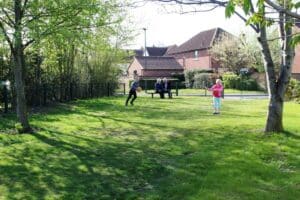Support us from £3/month
We deal with almost 1000 cases a year assisting communities, groups and individuals in protecting their local spaces and paths in all parts of England and Wales. Can you help us by joining as a member?
Introducing a new guide to help local councils protect precious green spaces and paths, Kate Ashbrook, our general secretary, says:
‘Often town, parish and community councils (local councils) are unaware of all the extensive powers they have to deal with problems on open spaces and paths.
‘These powers are scattered in different and sometimes obscure pieces of legislation. This is why we have brought them together in one document, What local councils can do for public access to town and countryside.’

Our new guide will help local councils understand their unique role in protecting commons, greens, other open spaces, and paths, such as this village green. Photo: Scorton Parish Council
The guide explains the powers specifically conferred on local councils, and the powers which, although available to the public in general, are best exercised by the local council because it has the authority and more resources than most individuals and voluntary organisations.
Kate continues: ‘For instance, local councils are best placed to take enforcement action against unlawful encroachment on a common or green. They can force the highway authority to remove obstructions on a public right of way, and use their unique power of veto to prevent the extinguishment or diversion of a route with vehicular rights, including roads and highway verges.
‘The society has many local-council members and we encourage others to join us, and to benefit from our training courses and our advisory service, so that they can exercise their legal powers in defence of open spaces and paths.’
The guide covers:
Common land—how to:
- consider applications for works, and to enforce against unlawful works;
- protect unclaimed land;
- protect against trespass and encroachment;
- regulate or manage a common or green (including one with no known owner);
- create common land.
Town and village greens—how to:
- protect from development and encroachment;
- voluntarily register;
- protect unclaimed land.
Other open spaces—how to:
- dispose of council-owned land legally;
- dedicate access rights;
- nominate as local green space (in England).
Public rights of way—how to:
- deal with obstructions;
- defend a route with vehicular rights against extinguishment or diversion;
- carry out maintenance;
- create a public right of way.
